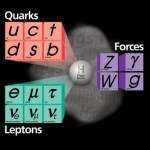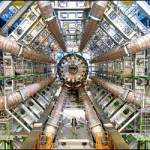lhc
"...the publisher wouldn't let us call it the Goddamn Particle, though that might be a more appropriate title, given its villainous nature and the expense it is causing."
-Leon Lederman, author of The God Particle
The Higgs Boson: you know the deal. It's the last undiscovered particle in our current picture of all the fundamental particles in the Universe.
Image credit: Fermilab, retrieved from eurekalert.org.
If we can find it, we'll either have a big clue as to what the next step to take in physics will be, or we'll be forced to admit that physics works too well, and many of the great…
At age 28, theoretical physicist Dr. Zohar Komargodski became head of a research group in the Institute's Particle Physics and Astrophysics Department. A recent paper, published with Prof. Adam Schwimmer of the Physics of Complex Systems Department, made some waves in the physics world with a proposed proof of a 23-year-old theorem. If the proof stands, it will have implications for many fields, including the analysis of LHC results and supersymmetry. Komargodski and Schwimmer claim they had been kicking around various ideas for a proof for several years before the solution came to them -…
This guest post was written by Brookhaven Lab physicist Kostas Nikolopoulos.
Today's public seminar at CERN, where the ATLAS and CMS collaborations presented the preliminary results of their searches for the Standard Model (SM) Higgs boson with the full dataset collected during 2011, is a landmark for high-energy physics!
The Higgs boson is a still-hypothetical particle postulated in the mid-1960s to complete what is considered the SM of particle interactions. Its role within the SM is to provide other particles with mass. Specifically, the mass of elementary particles is the result of their…
The Weizmann Institute's Prof. Eilam Gross is currently the ATLAS Higgs physics group convener. He originally wrote this piece in Hebrew for the Yediot Aharonot daily.
The Best There Is - For Now
"The God Particle," as the Higgs boson is often called, comes from the title of the book by Nobel laureate Leon Lederman that deals with the search for the elusive particle. This particle, according to the Standard Model of Particle Physics, is responsible for giving mass to all of the elementary particles in nature.
The mass of an electron determines the size of a hydrogen atom; ultimately the size…
The good news: Despite their best efforts, the folks at CERN failed to produce a black hole that sucked the entire earth into it! That would have been cool. The bad news is for string theory. What might be one of the few empirical tests for that tangle of math and stuff seems to have come out negative. From CERN:
The CMS experiment at CERN's Large Hadron Collider (LHC) has completed a search for microscopic black holes produced in high-energy proton-proton collisions. No evidence for their production was found and their production has been excluded up to a black hole mass of 3.5-4.5…
This guest post is written by BNL theoretical physicist Raju Venugopalan. After earning his Ph.D. from Stony Brook University in 1992, Venugopalan worked at several universities in the United States and at the Niels Bohr Institute in Copenhagen, Denmark, before joining Brookhaven in 1998. He is the leader of the nuclear theory group in Brookhaven's physics department.
Raju Venogopalan
Last week, members of the Compact Muon Solenoid (CMS) collaboration at CERN's Large Hadron Collider (LHC) announced that they've found a phenomenon that's similar to one observed by physicists at Brookhaven…
Earlier this week, there was some interesting discussion of science communication in the UK branch of the science blogosphere. I found it via Alun Salt's "Moving beyond the 'One-dinosaur-fits-all' model of science communication" which is too good a phrase not to quote, and he spun off two posts from Alice Bell, at the Guardian blog and her own blog, and the proximate cause of all this is a dopey remark by a UK government official that has come in for some justifiable mockery.
Bell and Salt both focus on the narrowness of the "dinosaurs and space" approach-- a reasonably representative quote…
In the comments following the silly accelerator poll, onymous wrote:
[T]he point of the LHC isn't to discover the Higgs. No one in their right minds would build a 14 TeV pp collider if their only goal was to discover the Higgs.
While it's true that the ultimate goal of the LHC is to discover more exotic particles that may or may not exist (blah, blah, supersymmetry, blah) most of the hype has focussed on the Higgs, which is the one thing they're pretty sure they'll find (comments later in that thread notwithstanding). This is one of the potential problems with the way the machine has been…
If you're American, chances are you'll be looking up this weekend for a spectacle of physics. But you also can look down from above -- way, way above -- to see the homes of some of the greatest physics experiments on Earth.
Brookhaven's Relativistic Heavy Ion Collider (RHIC) is probably one of the most visible particle accelerators from space.
Check out this satellite shot from 1982, when construction was underway for RHIC's predecessor, ISABELLE:
And this more recent aerial shot, taken in May:
RHIC is the first machine in the world capable of colliding heavy ions, which are atoms that…
OK, so Friday Fun a day late.
Anyways, April Fools day was a couple of days ago and I thought that the ScienceBlogs home page was the funniest science-related prank of the day.
So, for those of you that missed the headline and the little story that went with it, here goes:
CERN Scientists Awaken Balrog
When the Large Hadron Collider brought protons up to full speed on Tuesday,
smashing them together at 99 percent the speed of light, the world did not end
as some feared. But disturbing news emerged Thursday morning that CERN
scientists have desperately been trying to cover up a catastrophe of…
Just wanted to be one of the voices acknowledging day one of CERN's Large Hadron Collider. I know very little about it, but being a blogger I don't let that get in the way of talking about it!
You can read about it on Wikipedia, The Source of All That is Knowable.
Two interesting factoids I learned from a Science Friday podcast:
1. it shoots 100's of billions of protons at a time, thousands of times per second and accelerates them to 99.999999% o the speed of light! Sounds pretty fast.
2. it will not create something that swallows the earth or destroys the whole universe because the kind of…
The Large Hadron Collider is finally turning on.
A quick step backwards: the LHC is a particle accelerator, the largest of its kind, underwritten by all the wild money in science, a ringed tunnel some 27 kilometers long, deep underground, crossing the French-Swiss border at four points. It's been over twenty years in the making and has garnered the support of 10,000 scientists in 85 countries behind its unimaginable modus operandi: to recreate the environment of our universe as it was less than a millionth of a second after the Big Bang, and hence to reveal, among other things, the…
Hector writes in and asks about someone from Sheffield in the UK who says that the Large Hadron Collider (LHC) will create Dark Matter:
The massive ATLAS detector will measure the debris from collisions occurring in the Large Hadron Collider (LHC) which recreates the conditions found in the early universe during the Big Bang when Dark Matter was first created. If the LHC does indeed create such particles then it will be the first time that the amount of Dark Matter in the universe has increased since the Big Bang - the LHC will effectively be a Dark Matter 'factory'.
Well, Hector basically…



